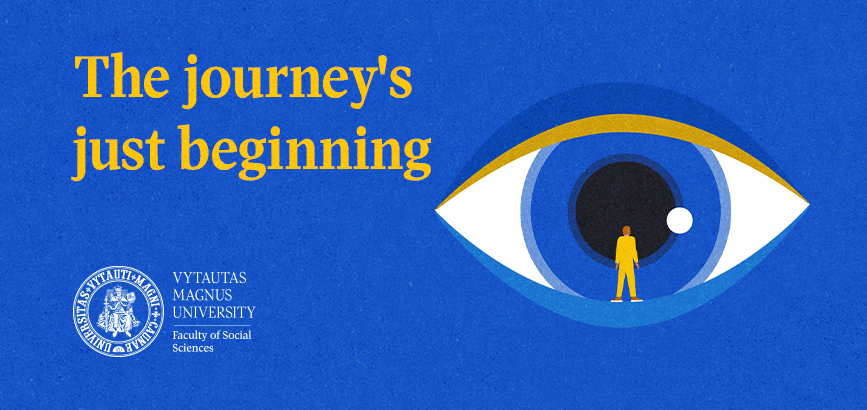| ABOUT US |
Psychology studies have been held in different departments since the establishment of the Vytautas Magnus University (VMU) in 1922. In 1950 the University was closed and several new higher school institutions have been established using the resources of Vytautas Magnus University. In 1989 VMU has been re-established and the Department of Psychology has been reestablished in 1990. In 2002 the Department of Psychology has been re-organised into two departments: Department of General Psychology (bachelor studies) and the Department of Theoretical Psychology (master studies). In September, 2016, both departments have been reunited into the Department of Psychology.
The Department of Psychology is responsible for the implementation of one undergraduate and three graduate study programs (School, Health and Organizational Psychology), as well as doctoral studies in psychology that are carried out in conjunction with Mykolas Romeris University (Vilnius, Lithuania).
In the Department a wide range of psychological research including the analyses of contemporary personal and public problems are performed. Since 2007, in collaboration with the Psychology Clinic, a research cluster entitled “Individual psychological and psychosocial functioning of the opportunities for improvement in organizations, educational and health institutions” has been started. Research, performed within the cluster, include studies of urgent problems of modern society – emigration, risky driving, psychological aspects of health and wellbeing and psychological support, sustainable leadership, educational psychology issues. The results are published in popular and scientific literature, reported in national and international conferences. The Department of Psychology, in collaboration with the Psychology Clinic is implementing national and international research projects and conferences as well as internal and external seminars and trainings.
|
|
Address: Jonavos str. 66 – 331, LT-44191 Kaunas
Phone +370 37 327 824, +370 37 327 947
e-mail: pka@vdu.lt |
 |
Head of Department
Dr. GABIJA JARAŠIŪNAITĖ-FEDOSEJEVA
e-mail: gabija.jarasiunaite-fedosejeva@vdu.lt |
 |
Senior administrator
NERINGA BARANAUSKAITĖ
Responsibilities – issues related to full-time undergraduate and part-time studies.
e-mail: neringa.baranauskaite@vdu.lt
|
 |
Senior administrator
IEVA KYBARTAITĖ
Responsibilities – issues related to full-time master’s studies. General questions.
e-mail: ieva.kybartaite@vdu.lt |
ACADEMIC STAFF
|
|
 |
Prof. Dr. LORETA BUKŠNYTĖ – MARMIENĖ
e-mail: loreta.buksnyte-marmiene@vdu.lt
Research interests:
- Psychosocial functioning of personality
- Psychological correlates of job performance
- Communication in organization
- Person – job/organization fit
- Counselling of organization
- Senior students’ psychosocial adaptation in school
- Diagnostic of conflicts and their management
- Career management
- Professional identity
|
 |
Prof. Dr. AUKSĖ ENDRIULAITIENĖ
e-mail: aukse.endriulaitiene@vdu.lt
Research interests:
- Psychological antecedents and consequences of safe and risky driving across the lifespan
- Job related attitudes and leadership
- Psychological antecedents and consequences of workaholism and occupational burnout
|
 |
Prof. Dr. AIDAS PERMINAS
e-mail: aidas.perminas@vdu.lt
Research interests:
- Stress, stress management and the aspects of coping with stress in various groups of individuals (e.g. aspects of children’s, adults’, students’ stress management)
- Psychological factors related to the diseases’ development
- Evaluation of the effectiveness of behaviour change intervention in psychological diseases’ prevention
- Personality traits related to the disease development
- Disease-prone personality
- Psychosocial factors related to eating behaviours and body image satisfaction
- The effectiveness of psychological interventions
|
 |
Prof. Dr. LIUDA ŠINKARIOVA
e-mail: liuda.sinkariova@vdu.lt
Research interests:
- Psychological factors’ peculiarities and psychological interventions’ efficiency of psychosocial rehabilitation
- The research of non-clinical psychological and behavioural difficulties in various sociodemographic groups
- The research of children and adolescent’s psychosocial adaptation
|
 |
Prof. Dr. KRISTINA ŽARDECKAITĖ – MATULAITIENĖ
e-mail: kristina.zardeckaite-matulaitiene@vdu.lt
Research interests:
- Effectiveness of psychological interventions
- Psychological aspects of risky behaviour (drug usage, risky sexual behaviour, risky driving, emigration)
- Interpersonal communication research (interpersonal relationships, verbal and nonverbal communication, relationship satisfaction)
- Gender issues in psychology research (gender similarities and differences, gender stereotypes)
- Research in religiosity/spirituality.
|
 |
Prof. Habil. Dr. ANTANAS GOŠTAUTAS
e-mail: antanas.gostautas@vdu.lt
Associated emeritus
Research interests:
- Methodology of medical and health psychology research
- Diagnostics and impact methods on health promotion
- Prevention of chronic non-infectious disease and health-related quality of life
- Integration of health psychology and professionalization of Health Psychologists in the health care system
|
 |
Assoc. Prof. Dr. VIKTORIJA ČEPUKIENĖ
e-mail: viktorija.cepukiene@vdu.lt
Research interests:
- Solution-Focused Brief Therapy research and practice in different contexts (individual, pair, family, community)
- Solution-focused self-help: theoretical premises, outcome studies
- Family psychology (psychological aspects of family communication, parents-children, and couple interactions)
- Resilience (of foster care adolescents)
|
 |
Assoc. Prof. Dr. LORETA GUSTAINIENĖ
e-mail: loreta.gustainiene@vdu.lt
Research interests:
- Positive psychosocial factors of human functioning within the context of organizational, school and health psychology (optimism, subjective well-being, psychological well-being, satisfaction with life, gratitude, forgiveness, work engagement, positive emotions, etc.)
- Job satisfaction
- Psychosocial risk factors at work; work-related stress
- Stress management (e.g. muscle relaxation, visualization)
- Psychosocial aspects of successful ageing; grandparenthood
|
 |
Assoc. Prof. Dr. VISVALDAS LEGKAUSKAS
e-mail: visvaldas.legkauskas@vdu.lt
Research interests:
- Psychological aspects of identity
- Factors associated with relationship satisfaction
- Development of social competence
- Motivation
- Creativity
- Social influence and manipulation
|
 |
Assoc. Prof. Dr. KRISTINA KOVALČIKIENĖ
e-mail: kristina.kovalcikiene@vdu.lt
Research interests:
- Person–job fit
- Professional identity and the importance of psychological characteristics for professional identity formation
- The impact of thinking styles in human resource management and education
- Work motivation
- Job satisfaction
|
 |
Assoc. Prof. Dr. RYTIS PAKROSNIS
e-mail: rytis.pakrosnis@vdu.lt
Research interests:
- Solution-Focused Brief Therapy: theory, practice, outcome research, application in different contexts (psychotherapy, family therapy, self-help, education, health care, organisations)
- Psychotherapy outcome, process research
- Positive psychology and personal strengths research
- Psychology of free will
|
 |
Assoc. Prof. Dr. AURELIJA STELMOKIENĖ
e-mail: aurelija.stelmokiene@vdu.lt
Research interests:
- The role of human resources in organizational development (psychological wellbeing of employees, work-family interface)
- Leadership psychology (different leadership theories, assessment of leadership effectiveness, gender and generation differences in leadership, relationships between leadership and parenting)
- Peculiarities of social perception in the context of organizational psychology
- Ethical issues in organizational psychology
|
 |
Assoc. Prof. Dr. LAURA ŠEIBOKAITĖ
e-mail: laura.seibokaite@vdu.lt
Research interests:
- Risky driving
- Hazard perception
- Development of Hazard perception measurement tools
- Psychosocial correlates of risk-taking behaviour in childhood, adolescence, and adulthood
- Developmental features in adolescence
- Psychological aspects of emigration
|
 |
Assoc. Prof. Dr. GABIJA JARAŠIŪNAITĖ – FEDOSEJEVA
e-mail: gabija.jarasiunaite-fedosejeva@vdu.lt
Research interests:
- Research of psychophysiological response to stressors, stress reduction
- Disease-prone personality
- Studies of the effectiveness of biofeedback and neurofeedback
- Psychological indicators and opportunities for psychological assistance related to reproductive health and childbirth experience
- Research in experimental psychology
- Health psychology research using a qualitative research approach
|
 |
Lect. Dr. RASA MARKŠAITYTĖ
e-mail: rasa.marksaityte@vdu.lt
Research interests:
- Emigration: factors, causes, emigrational attitudes
- Risky driving
- Emotion regulation and self-regulation
- Assessment of personality traits and cognitive skills
|
 |
Lect. Dr. JURGA MISIŪNIENĖ
e-mail: jurga.misiuniene@vdu.lt
Research interests:
- Cognitive psychology: psychological aspects of intelligence, creativity, and language (reading, writing, speaking)
- Identification of gifted children and their well-feeling in educational settings
- Factors determining realization of intellectual and creative abilities and level of academic achievements in child and young adult ages
- Psychological factors related to the school readiness
|
 |
Lect. Dr. UGNĖ PALUCKAITĖ
e-mail: ugne.paluckaite@vdu.lt
Research interests:
- Verbal and non-verbal self-disclosure in online and offline settings
- Risky youth behaviour on the Internet
- Interpersonal communication research
|
 |
Lect. Dr. LORETA ZAJANČKAUSKAITĖ – STASKEVIČIENĖ
e-mail: loreta.zajanckauskaite-staskeviciene@vdu.lt
Research interests:
- Topics of aggressiveness and self-esteem
- Peculiarities of self and illness perception of patients with various diseases
- Addictions to substances and behavior.
|
 |
Asist. dr. EGLĖ URVELYTĖ
e-mail: egle.urvelyte@vdu.lt
Research interests:
- Body image (body dissatisfaction, positive body image, prognostic and risk factors);
- Disordered eating behavior;
- Research on program effectiveness (interventions for correcting body image and disordered eating behavior).
|
 |
Asist. dr. GIEDRĖ GENEVIČIŪTĖ-JANONĖ
e-mail: giedre.geneviciute-janone@vdu.lt
Research interests:
- Psychological well-being of employees (job satisfaction, organizational commitment, professional burnout), risk and safety factors of psychological well-being;
- Work motivation;
- The psychological health of employees.
|
 |
PhD. Student RAMUNĖ BAGOČIŪNAITĖ
e-mail: ramune.bagociunaite@vdu.lt
Research interests:
- The Use of Artificial Intelligence in Organizations: The Significance of Individual Psychological Characteristics and Organizational Factors.
- Employees’ Attitudes Towards the Use of Artificial Intelligence Technologies in the Workplace.
|
 |
PhD. Student RASA KATINAITĖ
e-mail: rasa.katinaite@vdu.lt
Research interests:
- The experience of social security among individuals belonging to minority groups
- Research on coping with stress caused by discrimination and stigmatization
- LGBTQ+ individuals’ psychological distress and well-being
|
 |
PhD. Student TANNI CHOUDHURY
e-mail: tanni.choudhury@vdu.lt
Research interests:
- Coparenting and couple relationships
- Young adults and digital lives
- Love and relationships
|
 |
PhD. Student VITALIJA NAVICKĖ
e-mail: vitalija.navicke@vdu.lt
Research interests:
- Migraine symptom expression and pain coping self-efficacy in adults;
- Biopsychosocial models of health and health care;
- Psychophysiological studies
|
 |
PhD. Student LAURA ALČIAUSKAITĖ
e-mail: laura.alciauskaite@vdu.lt
Research interests:
- Motivational interviewing and its implementation in practice
- Health related behaviour
- The psychology of disabilities
- Psychosocial resources of people with physical disabilities
|
 |
PhD. Student MARIJA AUŠRAITĖ
e-mail: marija.ausraite@vdu.ltResearch interests:
- Stigma of children’ and adolescent’ mental illness
- Effectiveness of mental illness stigma reduction interventions
|
 |
PhD. Student JOVITA JANAVIČIŪTĖ-PUŽAUSKĖ
e-mail: jovita.janaviciute-puzauske@vdu.lt Research interests:
- Factors revealing improvements in cognitive function and emotions in stroke patients
- Psychological research on human evaluation
|
 |
PhD. Student OLGA KIREJEVA
e-mail olga.kirejeva@vdu.lt
Research interests:
- Psychosocial predictors of moral distress within helpers’ profession and its impact on their health
- Features of psychosocial support of vulnerable groups of persons
|
 |
PhD. Student MODESTA MORKEVIČIŪTĖ
e-mail: modesta.morkeviciute@vdu.ltResearch interests:
- Work-related behaviour
- Non-substance addictions
- Leadership theories and outcomes
|
 |
PhD. Student ANDRIUS ŠMITAS
e-mail: andrius.smitas@vdu.lt
Research interests:
- Positive psychosocial factors of human functioning
|
 |
PhD. Student TADAS VADVILAVIČIUS
e-mail: tadas.vadvilavicius@vdu.lt
Research interests:
- Work-family spillover
- Dark triad personality model
- Leadership psychology
|
 |
PhD. Student ERIKA GIBĖ
e-mail: erika.gibe@vdu.lt
Research interests:
- Psychosocial factors predicting body dissatisfaction and disordered eating behaviour
- Psychosocial factors predicting health-promoting behaviour in pregnancy and postpartum
- Intervention programs for stress reduction
|
| Visiting lecturers |
M. Bartollo (University of Malta/ „Willingness“ clinic, Malta)
L. Bieliauskas (Michigan State University, USA)
D.Hoff (University of Nebraska at Kearney, USA)
D.R.Tillman (University of Nebraska at Kearney, USA)
A. Ozolins (Linnaeus University, Sweden) |
















































